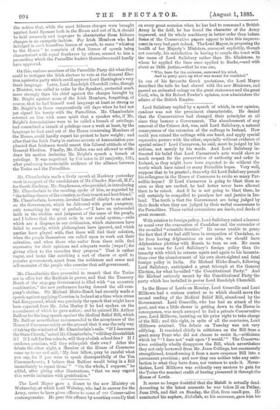On this, various members of the Parnellite Party did what
they could to instigate the Irish electors to vote at the General Elec- tion against a party which could approve Lord Hartington's very frank language. Later, Lord Randolph Churchill (who, though a Minister, was called to order by the Speaker), protested much more strongly than his chief against the charges brought by Mr. Bright against some of the Irish Members, forgetting, of course, that he had himself used language at least as strong as Mr. Bright's in those comparatively old days when he had not yet signed his treaty with the Parnellites. Mr. Chamberlain retorted on him with some spirit that a speaker who, if Mr. Bright's denunciations were to be called a breach of privilege, had committed a breach of privilege once a week at least, by the language he had used out of the House concerning Members of the House, could hardly expect his protest to have weight ; and after that the Irish Party in various accents of denunciation pro- phesied that Irishmen would resent this Liberal attitude at the 'General Election. Finally, Mr. Callan was not allowed to with- draw his motion declaring Mr. Bright's speech a breach of privilege. It was negatived by 154 votes to 23 (majority, 131), after producing incontestable evidence of the alliance between the Tories and the Parnellites.


































 Previous page
Previous page